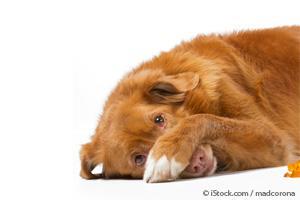What Your Dog’s “Guilty Look” Tells You – And What It Doesn’t

Story at-a-glance
- “Dog shaming” pictures and videos are hugely popular these days, which has led many people to wonder what’s really behind their dog’s guilty look
- Most veterinary behaviorists believe that despite “the look,” dogs don’t feel shame
- A small scientific study conducted in 2009 suggests the “guilty” reaction dogs display is in response to being scolded by their owner, not from feelings of shame
By Dr. Becker
I’m sure all you dog lovers out there have seen at least a few of the “dog shaming” videos and pictures that have popped up on the Internet over the last few years. In many of them, the dog looks truly guilty or embarrassed, and the “thought bubbles” or signs the owners add to explain why the dog is feeling ashamed are often hilarious.
Here’s a quick example:
But do dogs really feel shame?
Is There a Connection Between Your Dog’s ‘Look’ and Feelings of Guilt?
Not according to dog behaviorists, who believe that hangdog look, you know the one -- lowered head, ears back, pleading eyes – is simply your pet’s reaction to the hissy fit you’re throwing over something he did earlier.
According to Dr. Bonnie Beaver, a professor at Texas A&M University’s College of Veterinary Medicine and executive director of the American College of Veterinary Behaviorists, you should “Just get over it and remind yourself not to put temptation in the way next time.”
Jeremy Lakaszcyck of Boston agrees. He’s the owner of Maymo, the dog in the video above. Maymo is a lemon Beagle whose YouTube shaming videos are enormously popular. According to Lakaszcyck, Maymo’s naturally guilty face and his reaction when he’s spoken to in a stern voice are video gold.
“Maymo can sit for quite a while looking sad because he’s a ham,” says Lakaszycyck. “It’s natural, and he knows a treat is coming. His tail usually wags through the wait. It’s like he’s happy on one end and sad on the other,” he said.
Study Suggests ‘The Look’ Is a Reaction to Being Scolded
In 2009, Alexandra Horowitz, an associate professor of psychology at Barnard College and author of the book, Inside of a Dog: What Dogs See, Smell, and Know, published one of the first scientific studies on dogs and feelings of guilt or shame.1
Horowitz’s study involved 14 dogs who were put through a series of trials to see how they reacted when their owner told them not to eat a treat, then left the room. When the owners returned, sometimes they knew what the dogs had done, and sometimes they didn’t. Sometimes the dogs had eaten the treats, and sometimes they hadn’t.
Horowitz observed that the dogs assumed “the look” most often when their owners reprimanded them, regardless of whether or not they had disobeyed. And in fact, the dogs reacted more to a scolding when they had behaved themselves than when they were disobedient.
According to Horowitz, the dogs weren’t displaying “guilt,” but a reaction to the owner’s tone of voice. However, she doesn’t rule out the possibility that dogs may feel guilt – she simply points out that “the look” isn’t an indication of it.
Of course, our dogs certainly do learn from their bad behavior, but only if our reaction occurs as the behavior is happening, or immediately afterward. The longer the elapsed time between your dog’s bad deed and your reaction, the less connection she’ll make between the two.
© Copyright 1997-2015 Dr. Joseph Mercola. All Rights Reserved.
http://healthypets.mercola.com/sites/healthypets/archive/2015/03/04/dog-shaming-pictures-videos.aspx